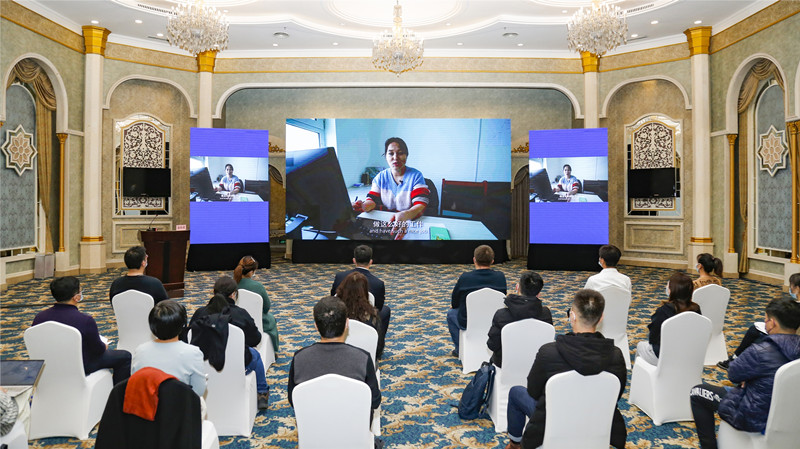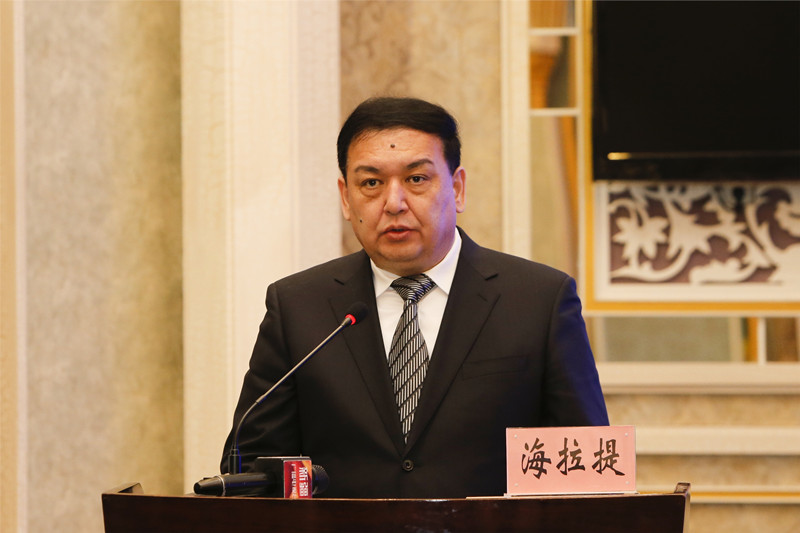The Special Press Conference of Xinjiang Uygur Autonomous Region on Labor and Employment
November 20, 2021

Photo taken on November 20, 2021 shows the special press conference of Xinjiang Uygur Autonomous Region on labor and employment. Photo by Xinjiang Daily/ Xie Long
On November 20, 2012, the special press conference of Xinjiang Uygur Autonomous Region on labor and employment was held. Nine video clips were shown live, introducing the workers’ stories of making a change in their lives and creating happiness through work in Xinjiang. They retaliate forcefully against lies and fallacies such as the so-called “forced labor” fabricated by the anti-China forces in the United States and several western countries.
Host: Good morning, fellow media reporters! Welcome to the press conference of Xinjiang Uygur Autonomous Region on labor and employment. I’m Hailati, the host of this press conference.

Photo taken on November 20, 2021 shows Hailati, the host of the special press conference of Xinjiang Uygur Autonomous Region on labor and employment. Photo by Xinjiang Daily/ Xie Long
Host: Work creates a better life and enables all-around human development and the progress of civilization. The Constitution of the People’s Republic of China provides that all citizens have the right and obligation to work. To protect the right to work is to safeguard human dignity and human rights. Xinjiang insists on facilitating employment as the most fundamental project for ensuring and improving people’s well-being. Xinjiang has vigorously implemented employment projects, enhanced vocational training, and expanded employment channels and capacities. Thanks to these efforts, the employment situation in Xinjiang has continued to improve, people’s incomes and quality of life are rising, and their sense of gain, happiness and security has significantly increased.
Xinjiang always takes respecting the workers’ job preferences as an important reference in designing its employment policies, expanding employment channels, creating jobs, organizing vocational training sessions and providing employment services to ensure that all the people can make their own choices about work and enjoy a happy life. In Xinjiang, it is entirely up to people of all ethnic groups to decide whether to work, where to work and when to work and the types of jobs and salaries are negotiated between enterprises and workers on the basis of market principles on an equal and voluntary basis.
Xinjiang protects workers in various industries to work with decency from policies and regulations, pay and benefits, social security, and occupational health etc..People of all ethnic groups in Xinjiang have found suitable jobs through independent choice. They move from rural to urban areas, from fields to workshops, and turn from farmers to workers. In this process, they learn skills, increase their incomes, and achieve prosperity; more importantly, they have broadened their horizons, acquired knowledge and greater abilities, and achieved their potential.
Host: Rahman Ruze is from Shache County, Kashgar Prefecture. He and his wife have been working in Fuyun County, Altay Prefecture for four years. As he has improved from a common worker to a team leader, his incomes has increased. Rahman Ruze and his wife also run a store and sell delicacies such as deep fried egg, fried eggs, pepper naan etc., which are the favorites of their hometown and well received in Fuyun County. Moving from south Xinjiang to north Xinjiang, Rahman Ruze and his wife work together and try to create their wonderful life together. Now let’s feel the happy life of Rahman Ruze and his family.
Host: Three years ago, Guzailinuer Aimaier came to Wusu City, Tacheng Prefecture from Shache County, Kashgar Prefecture and became an information entry clerk of the company. The company provides them with proper accommodation and daily necessities.There is a staff canteen too. It’s very convenient for them to live there. Now let’s have a look at Guzailinuer Aimaier’s happy life.
Host: Ayinuerhan Imin is an employee of an electronic repair factory in Hotan Prefecture. After she was recruited, thanks to technicians’ instructions, she was able to get to work soon to be in charge of device assembly. Now Ayinuerhan Imin who left home not only has a new life and a new direction to strive for, but also becomes more fashionable and beautiful. Now let’s follow her story.
Host: Nurali Mamat, a young man of Shache County, Kashgar Prefecture came to work at a seed company in Changji Hui Autonomous Prefecture. His job is to observe seeds growth. Although he comes to work in the field in another place, now the seeds they’ve cultivated enable farmers to have remarkable income increases. So he is full of sense of achievement and self-confidence in his job now and has great potential in a larger sphere of life. Now let’s have a look at Nurali Mamat’s work and life.
Host: Zulipiyemu Yakupu is a farmer of Akto County, Kizilsu Kirgiz Autonomous Prefecture. She came to work at Yuanquan Investment and Development Co., Ltd. in Akto County after seeing the recruitment information at the village committee. As she is conscientious at work, she is promoted from a worker to a team leader and supervises more than 20 workers. She has a stable income and lives a very happy life. Now let’s have a look at her life through the video clip.
Host: After graduating from college, Nuermaimaiti Baiker came back to work in his hometown. He has become the team leader of the plate mill with his efforts and makes more than RMB 6,000 a month. He says he hopes to tour around the country with his family for the folk customs of different places. Now let’s watch a video clip of Nuermamat’s happy life.
Host: Amannisha Aihet from Kashgar Prefecture is a cement plant laboratory worker. She is enterprising in life, loves dancing and enjoys working out. She is very filial to her parents and her immediate goal is to get a car and take them to tour around. She says, she feels very proud of her contribution every time she sees the city’s tall buildings. Now let’s have a look at Amannisha Aihet’s happy life.
Host: Adili Abdureheman who came to Urumqi from Yopurga County, Kashgar Prefecture now schedules voyagers at Xinjiang Bayi Iron & Steel Co.,Ltd.. With unyielding efforts, he has bought a car and an apartment in Urumqi and married a beautiful wife. He’s also brought his mother and younger brother to Urumqi and they live a very happy life. Now let’s see what Adili wants to say.
Host: Nureaminaimu Aikebaire from Kashgar Prefecture now works as a waitress in a restaurant. She has settled into life here and made many friends. She often goes shopping with friends when she is free from work to get a feel of joys in life. Now let’s watch a video clip of Nureaminaimu’s happy life.
Host: The nine video clips we watched just now enable us to have a look at the sights of ethnic minority workers’ happy work and joyful life, which is only a miniature of the happy life of people of all ethnic groups in Xinjiang. For some time, the anti-China forces in the United States and several western countries fabricated the lie that there’s so-called “forced labor” in Xinjiang regardless of facts for the ulterior intention of obscuring facts to defame the image of Xinjiang, China.
The truth is Xinjiang effectively protects the workers’ rights to equal employment, remuneration, rest and leave, occupational safety, freedom of religious belief and the use of their own language and script.It actively conforms to international labor and human rights standards, and has laid a solid foundation for raising the human rights to life and development to a higher level across a broader sphere.
Work helps to make a difference and create happiness. Looking forward, Xinjiang will continue its commitment to the people-centered philosophy of development, adhere to the principle that employment is of paramount importance to people’s well-being, implement the strategy of giving priority to employment, and introduce more proactive policies to boost employment. With tireless efforts it will strive to boost employment in volume and quality, to meet the growing expectation of all ethnic groups for a better life.
Host: That’s the end of today’s press conference. Thank you.








